Paul Levinson's Blog: Levinson at Large, page 282
April 3, 2015
12 Monkeys 1.12: The Plunge
 An unusually paradoxical episode of 12 Monkeys tonight - 1.12, with the self-referential #12, aptly named "Paradox" - which actually artfully skirted with paradox, rather than plunged right into it - except once - which could have torn the story asunder.
An unusually paradoxical episode of 12 Monkeys tonight - 1.12, with the self-referential #12, aptly named "Paradox" - which actually artfully skirted with paradox, rather than plunged right into it - except once - which could have torn the story asunder.Other than the plunge, the closest to actual paradox was Cole as a boy nearly meeting Cole the adult hero of our story - the TVs show's nod to the incandescent airport scene at the end of the movie. In the metaphysics of the television show, two people meeting themselves like that - that is, an older and younger version of the same person - could have catastrophic physical consequences, that go beyond the psychological, philosophical loops of suddenly remembering meeting your earlier self, and the infinite mirror-of-mirror regress that could/would result from that.
But there are lots of other goodies. Cole's father meets his grown son, and sacrifices his life to save him. Young Cole meets young Ramse - and, remember, based on what we saw last week, adult Ramse is now on hand in this time, too. Most enjoyably, we meet a younger Jones, and Railly is crucial in starting Jones on her pivotal career. (I guess I have to now admit that I was wrong that Jones was really an older Railly - would have been a nice twist.) We also learn about the piece of paper passed between Railly and Cole in an earlier episode - it contains the address of where the young Cole is now, i.e., where he is 2015.
The logic of the value of the young Cole to our story is sound - his blood can save the older Cole, nothing like getting a little transfusion or even just a shot of antibodies from your younger self, a plunge of antibodies to counter the ravages of time travel, if the plunge itself doesn't kill you. In this sense, the son was truly and literally father to the man, or the man that the older Cole will now continue to be.
The death of Cole's father, sad as it was to both young and older Cole, was a noble sacrifice to the time travel story, down to the way that Railly handled it. Unclear, though, is what happened exactly to the Witness - was he blown to bits in the profound wrenching in time/space when older Cole injected himself with his younger self's blood? Was he a casualty of the plunge of that needle? If so, we still don't know exactly who he was - the closest we've come is Ramse's word at the end of the last episode that he knows the identity of the Witness.
Lots of wheels within wheels turning in impossible directions for next week's season finale.
See also this Italian review, w/reference to Hawking and my story, "The Chronology Protection Case"
And see also 12 Monkeys series on SyFy: Paradox Prominent and Excellent ...12 Monkeys 1.2: Your Future, His Past ... 12 Monkeys 1.3: Paradoxes, Lies, and Near Intersections ... 12 Monkeys 1.4: "Uneasy Math" ... 12 Monkeys 1.5: The Heart of the Matter ... 12 Monkeys 1.6: Can I Get a Witness? ... 12 Monkeys 1.7: Snowden, the Virus, and the Irresistible ... 12 Monkeys 1.8: Intelligent Vaccine vs. Time Travel ... 12 Monkeys 1.9: Shelley, Keats, and Time Travel ... 12 Monkey 1.10: The Last Jump ... 12 Monkeys 1.11: What-Ifs
podcast review of Predestination and 12 Monkeys



three time travel novels: the Sierra Waters trilogy

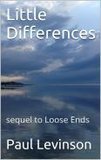
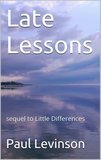
What if the Soviet Union survived into the 21st century,
and Eddie and the Cruisers were a real band?

The Chronology Protection Case movie
~~~ +++ ~~~
#SFWApro
Paul Levinson's books ... Paul Levinson's music
Published on April 03, 2015 20:35
April 2, 2015
Vikings 3.7: At the Gates
 It was a fearsome sight indeed - Ragnar and the Vikings, torches and souls ablaze, weapons in hand and war machines constructed by Floki at the ready, at the gates of Paris. Alas, this came at the very end of episode 3.7, so we'll have to wait until next week to see the result.
It was a fearsome sight indeed - Ragnar and the Vikings, torches and souls ablaze, weapons in hand and war machines constructed by Floki at the ready, at the gates of Paris. Alas, this came at the very end of episode 3.7, so we'll have to wait until next week to see the result.In the meantime, we were treated to a deep introduction to the French court, almost as different from the English monarchies we have seen as they are from the Norse. The French have an intensity that the English apparently lack at this time and age, likely because they are much closer to Rome - the Vatican and the Roman Empire - as well as to Charlemagne, the grandfather of the King now in Paris. Will the Vikings be able to overcome this?
Well, history tells us that Ragnar succeeded, but his success followed Norse failures and was followed by the same. What made Ragnar's attack against the advanced culture of the French successful, when other Viking attacks were not? The answer is likely Floki, more demented now than ever, but apparently still a genius, not only in the construction of ships but seige equipment to surmount the high walls of the city.
Ragnar knows this, and yet it's clear that a part of him wants Floki dead, in retribution for Floki's murder of Althelstan. Did Ragnar put Floki in charge of the attack, because Ragnar is hoping Floki dies in that attack? Since Floki, unlike the French and English kings, is not a known historical person, and, unlike Ragnar, not the subject of epic Norse legends (he's apparently not the historical Floki who sailed to Iceland, but who knows), anything can happen - this Floki, in other words, is likely protected by neither history nor legend.
Meanwhile, back in England, the comings and goings of its royalty are. But with Ecbert revealed as a vicious megalomaniac - stripped of the goodness which we thought we saw in him last season and at the beginning of this one - what now happens to him is suddenly less interesting than what is about to happen in Paris.
See also Vikings 3.1. Fighting and Farming ... Vikings 3.2: Leonard Nimoy ...Vikings 3.3: We'll Always Have Paris ... Vikings 3.4: They Call Me the Wanderer ... Vikings 3.5: Massacre ... Vikings 3.6: Athelstan and Floki
And see also Vikings 2.1-2: Upping the Ante of Conquest ... Vikings 2.4: Wise King ... Vikings 2.5: Caught in the Middle ... Vikings 2.6: The Guardians ...Vikings 2.7: Volatile Mix ... Vikings 2.8: Great Post-Apocalyptic Narrative ... Vikings Season 2 Finale: Satisfying, Surprising, Superb
And see also Vikings ... Vikings 1.2: Lindisfarne ... Vikings 1.3: The Priest ... Vikings 1.4: Twist and Testudo ... Vikings 1.5: Freud and Family ... Vikings 1.7: Religion and Battle ... Vikings 1.8: Sacrifice
... Vikings Season 1 Finale: Below the Ash

historical science fiction - a little further back in time
#SFWApro
Paul Levinson's books ... Paul Levinson's music
Published on April 02, 2015 21:09
map for The Plot to Save Socrates
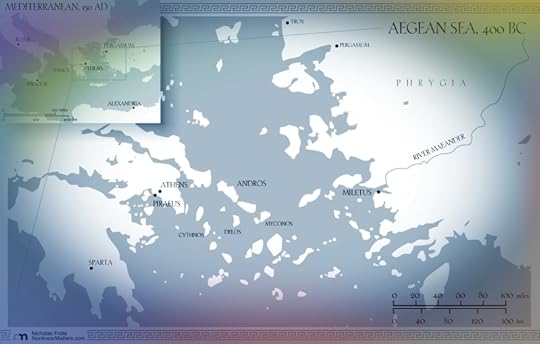
The Plot to Save Socrates by Paul Levinson, original English
Romanian translation (by Nina Iordache): Complot Pentru Salvarea Lui Socrate
Spanish translation (by Liliana Ganduglia): El Complot para Salvar a Sócrates - on Kobo ... Barnes & Noble ... iTunes
What they're saying about the novel...
"...challenging fun" - Entertainment Weekly
"Da Vinci-esque thriller" - New York Daily News
"...a fun book to read" - Dallas Morning News
"resonates with the current political climate . . . . heroine Sierra Waters is sexy as hell . . . . there's a bite to Levinson's wit" - Brian Charles Clark,Curled Up With A Good Book at curledup.com
"a journey through time that'll make you think as it thrills ... so accessible, even those generally put off by sci-fi should enjoy the trip." - Rod Lott, bookgasm.com
"Levinson spins a fascinating tale ... An intriguing premise with believable characters and attention to period detail make this an outstanding choice... Highly recommended." - Library Journal, *starred review
"Light, engaging time-travel yarn . . . neatly satisfies the circularity inherent in time travel, whose paradoxes Levinson links to Greek philosophy." - Publishers Weekly
"A thinking person's time travel story... I felt like I was there." - SF Signal
 "This is a dazzling performance. . . .History as science fiction; science fiction as history." - Barry N. Malzberg
"This is a dazzling performance. . . .History as science fiction; science fiction as history." - Barry N. Malzberg"... quick-to-read, entertaining treatment of the problems inherent in time travel with style and flair" - Booklist
"There's a delightfully old-fashioned feel to The Plot to Save Socrates. . . . Levinson's cool, spare style reminded me of the writing of Isaac Asimov. . ." - Colin Harvey, Strange Horizons
"Paul Levinson's new novel is both very different from anything he has done before and very satisfying. . . . This, I think, is the first of Levinson's novels to deserve to be called a tour de force. Watch for it on award ballots." - Tom Easton, Analog: Science Fiction and Fact
"it's exciting to see a book as daring with both its ideas and its approach to narrative structure as this one hit the shelves . . . It's an absolute treat to sit back and be wrapped up in a story that gives a retro SF premise like time travel such a brilliant new kick, and it's doubly delightful to find the story as fun and entertaining as it is thought-provoking." - SF Reviews.net
"proves that excellent entertainment can and ought to be intellectually respectable -- a glorious example to us all." - Brian Stableford
"...readers are sure to enjoy his take on the paradoxes of time travel" -BookPage
"Intricately and intriguingly woven, lots of fun, and extremely thought provoking." - Stanley Schmidt
"Paul Levinson has outdone himself: The Plot to Save Socrates is a philosophically rich gem full of big ideas and wonderful time-travel tricks." - Robert J. Sawyer
"as happens with Kurt Vonnegut's Billy Pilgrim . . . . the reader soon becomes unstuck in time . . . . Levinson presents one of the most unique books I've ever encountered. A highly recommended read." - Matt St. Amand
"Paul Levinson brings both intellectual heft and affection for his delightfully depicted characters to this highly original story of time travel . . . bringing all of its threads together in an ending that is emotionally satisfying and extremely moving. The Plot to Save Socrates will provoke thought long after readers have finished the book, at which point many may want to pick it up and read it again, to savor its twists and turns." - Pamela Sargent, SFWeekly
"Fast-paced and full of plot twists." - Davis Enterprise (California)
"an elaborately-reasoned temporal tale - a novelized thought experiment whose logic and ideas Socrates would have approved of" - John Joseph Adams, intergalacticmedicineshow.com
"a philosophically rich, engaging time travel story . . . a charming portrayal of Socrates" - Fantasybookspot.com
"a fun romp through 2500 years of Western history" - freshfiction.com
"I've never read anything like this before . . . The Plot to Save Socrates is highly, original, creative, and engaging. I enjoyed it from the first page." - Book.of.the.moment. at myspace.com/book_of_the_moment.com
"revels in the possibilities for paradoxes . . . . fresh and welcome" - Steven Silver's Reviews at sfsite
"frankly, he [Levinson] is one of my 'read on sight' authors . . . The Plot to Save Socrates is a tapestry of times and characters and philosophies, with an excellent look at history. . . ." - Jerry Wright, Bewildering Stories at bewilderingstories.com
"a very intelligently written novel . . . ." - GF Willmetts, at SFcrowsnest.com
"Paul Levinson handles a complicated plot and a multitude of characters in a manner that can only be described as masterful. . . . I highly recommend this book, and I won't be surprised if it wins several awards." - Scott M. Sandridge, specmusicmuse
"This book was a lot of fun, and surprisingly poignant at the end. (Yes, I'll admit I cried a little.) . . . I was worried this would be a fairly cold sci-fi book, where I never got to like any of the characters, but somehow by halfway through I found I really cared about them. I'm not sure how Levinson managed that . . . but somehow they all just got inside me." - Lady Amalthea, eharlequin.com
". . . a new metaphor for the literary tradition of time travel." - Robert Blechman, blogcritics.org
"Socrates has always seemed a rather dour and dull figure to me but Paul Levinson breathes new life into this time." - Debbie, ck2skwipsandkritiques.com
"an extremely engaging, entertaining story. . ." - Laurie Thayer, Rambles.net
"truly a thought-provoking, breathtaking, and highly entertaining novel." - Lysette Brodey, PerpetualProse.com
"The Plot to Save Socrates turns on its head Plato's report of Socrates' poisoning ..." - Gerry Elman, Esq., Stanford Alumni Blog
"Doppelgangers, deception, and the sheer amount of historical reference alone make this novel magnificant, but that is not all!... Paul Levinson has created a historical text for all ages, making the plot flow like wine and pleasing to even the most hesitant of readers." - Jenna A, luxuryreading.com
"I was hooked by the second page." - Kanti Burns, Book Reviews and More
"A lively cast of historical figures populates this epoch-bending adventure, highly recommended especially for fans of alternate history novels!" - Midwest Book Review
Paul Levinson's books ... Paul Levinson's music
Published on April 02, 2015 11:55
April 1, 2015
The Americans 3.10: The Truth
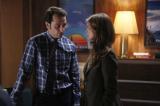 Well, The Americans in episode 3.10 tonight finally got down to brass tacks, with the best show of the season and among the best of the entire series. Elizabeth and Philip tell Paige the truth of who they are and what they're doing. Well, most of the truth, a sanitized truth, anyway, without the killings, but enough of the truth to set the whole narrative on edge and Elizabeth and Philip in the most peril they've been in when not precisely at the wrong of a gun.
Well, The Americans in episode 3.10 tonight finally got down to brass tacks, with the best show of the season and among the best of the entire series. Elizabeth and Philip tell Paige the truth of who they are and what they're doing. Well, most of the truth, a sanitized truth, anyway, without the killings, but enough of the truth to set the whole narrative on edge and Elizabeth and Philip in the most peril they've been in when not precisely at the wrong of a gun.If Paige reveals even this incomplete truth to the pastor, or anyone, that would blow up our entire story, that we've come to know and love, to the skies. The Americans would end as we know it. But how can The Americans continue with Paige knowing what she knows and not revealing it to anyone?
She passes her first test in an especially harrowing scene in which does call that pain-in-the-a pastor, and tells him ... not that her parents are Soviet spies, but that she finally broached the topic of why their life has been so strange - why she has no aunts and uncles, etc - and she received some kind of truthful answer. The cool with which Paige handled this conversation - the fact that she called the paster - was impressive indeed. She realized, consciously or not, that the best way of protecting her family was to tell the pastor at least this something now, and then likely throw him off the track later, when she had a better handle on things. Elizabeth and Philip raised their daughter well.
This development now puts The Americans on a powerful new footing, in which Paige will sooner or later need to help her parents, in addition to just nor turning them in. And this razor backdrop raises the stakes on everything else.
For example, there's still Martha. It looks as if Stan might be a bit suspicious of her. And if the FBI starts homing in on Martha, Philip's position will suddenly get very untenable. Stan's antennae are always up - including at his neighbors' house, where he senses that something is not quite right with Paige. But, again, she covers pretty well.
The rest of this season promises some truly uncharted territory for the third season of this series, which is welcome indeed.
See also The Americans 3.1: Caring for People We Shouldn't ... The Americans 3.3: End Justified the Means ... The Americans 3.4: Baptism vs. Communism ... The Americans 3.6: "Jesus Came Through for Me Tonight" ...The Americans 3.7: Martha. My Dear ... The Americans 3.8: Martha, Part 2
And see also The Americans 2.1-2: The Paradox of the Spy's Children ... The Americans 2.3: Family vs. Mission ... The Americans 2.7: Embryonic Internet and Lie Detection ... The Americans 2.9: Gimme that Old Time Religion ...The American 2.12: Espionage in Motion ... The Americans Season 2 Finale: Second Generation
And see also The Americans: True and Deep ... The Americans 1.4: Preventing World War III ... The Americans 1.11: Elizabeth's Evolution ... The Americans Season 1 Finale: Excellent with One Exception
#SFWApro
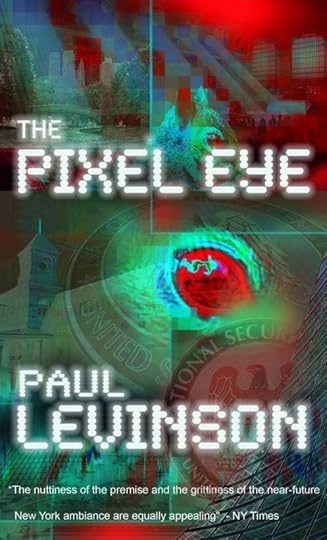
Like a post Cold War digital espionage story? Check out The Pixel Eye
Paul Levinson's books ... Paul Levinson's music
Published on April 01, 2015 21:37
March 31, 2015
Beau Willimon at Fordham
I saw Beau Willimon at Fordham University earlier this evening - thanks to my colleague Beth Knobel (erstwhile CBS Moscow bureau chief) for arranging this. The hour was the best of this kind I've ever attended. By which I mean, a creator of a landmark work talking incisively, truthfully, vividly about the creative and business processes employed in bringing the work to life.
Among the highlights of Willimon's disclosures and lessons imparted -
He started his creative life as an illustrator and painter, but found the static image insufficient to tell the stories he wanted to tell. (See illustrator Joel Iskowitz for an opposite point of view.)Willimon says the revolution in television-making founded and exemplified by his House of Cards is that a writer, producer, creator can sell not just a pilot but an entire season of a series to a distributor like Netflix. I'd say that this, in effect, is the creator's side of what we viewers experience and enjoy as binge all-at-once watching of a television series, and this increase of creative control in the producer's hands may be the beginning for television of what Kindle publishing has done for authors on Amazon.Willimon think that there's here's no such thing as writer's block - I've long thought much the same, that cries of writer's block are evasions. Willimon put an even finer point on this, explaining that writer's block is really not inability to write but unwillingness to confront a possible failure. Indeed, Willimon emphasized that we should embrace not run from failure - a view very much in tune with Kark Popper's (one of my favorite 20th century philosophers) that we learn more from our mistakes than our successes.Willimon says the auteur theory of film (and, by extension, television) is overrated and untrue - these creative forms are inherently collaborative efforts. (I was thinking that one of the reasons I like writing novels and short stories is that I don't have to collaborate too much with anyone.)Willimon's favorite scene in the third season of House of Cards was Frank Underwood and Tom Yates first getting down to brass takes about Tom's life. Just about every scene with Tom was among my favorites in the third season.One of the great perks of the academic life is getting an hour like this - reflections from someone whose work initiated what I think of as the third golden age of television - the first being in the 1950s, the second in the first decade of the 21st century with shows like The Sopranos (no commercials, no FCC restrictions on content), and the third being right now with House of Cards - already joined by Peaky Blinders, Bosch, Bloodline, and more.
See also House of Cards 3: Frank, Claire, "Putin," and Superb ... House of Cards Season 2: Even Better than the First, and Why ... House of Cards Season 1: A Review Paul Levinson's books ... Paul Levinson's music
Among the highlights of Willimon's disclosures and lessons imparted -
He started his creative life as an illustrator and painter, but found the static image insufficient to tell the stories he wanted to tell. (See illustrator Joel Iskowitz for an opposite point of view.)Willimon says the revolution in television-making founded and exemplified by his House of Cards is that a writer, producer, creator can sell not just a pilot but an entire season of a series to a distributor like Netflix. I'd say that this, in effect, is the creator's side of what we viewers experience and enjoy as binge all-at-once watching of a television series, and this increase of creative control in the producer's hands may be the beginning for television of what Kindle publishing has done for authors on Amazon.Willimon think that there's here's no such thing as writer's block - I've long thought much the same, that cries of writer's block are evasions. Willimon put an even finer point on this, explaining that writer's block is really not inability to write but unwillingness to confront a possible failure. Indeed, Willimon emphasized that we should embrace not run from failure - a view very much in tune with Kark Popper's (one of my favorite 20th century philosophers) that we learn more from our mistakes than our successes.Willimon says the auteur theory of film (and, by extension, television) is overrated and untrue - these creative forms are inherently collaborative efforts. (I was thinking that one of the reasons I like writing novels and short stories is that I don't have to collaborate too much with anyone.)Willimon's favorite scene in the third season of House of Cards was Frank Underwood and Tom Yates first getting down to brass takes about Tom's life. Just about every scene with Tom was among my favorites in the third season.One of the great perks of the academic life is getting an hour like this - reflections from someone whose work initiated what I think of as the third golden age of television - the first being in the 1950s, the second in the first decade of the 21st century with shows like The Sopranos (no commercials, no FCC restrictions on content), and the third being right now with House of Cards - already joined by Peaky Blinders, Bosch, Bloodline, and more.
See also House of Cards 3: Frank, Claire, "Putin," and Superb ... House of Cards Season 2: Even Better than the First, and Why ... House of Cards Season 1: A Review Paul Levinson's books ... Paul Levinson's music
Published on March 31, 2015 19:25
The Experiment with "The Other Car"
 Hey, I don't usually talk much inside baseball here about my science fiction writing - how and why I make decisions to get my stories published in this place or that, or try to get them published - but I thought you might enjoy a little of the story behind the story of my recently published The Other Car, which I put up as an ebook on Amazon about two weeks ago.
Hey, I don't usually talk much inside baseball here about my science fiction writing - how and why I make decisions to get my stories published in this place or that, or try to get them published - but I thought you might enjoy a little of the story behind the story of my recently published The Other Car, which I put up as an ebook on Amazon about two weeks ago.First, as some of you may know, this is the not way I've ever published my short stories. All of the 40 short science fiction and fantasy stories I've published since 1991 - you can see a list of most of them here, at the Internet Speculative Fiction Data Base - were published the good old-fashioned traditional way. I sold the story to a magazine - whether print, or more recently, online, or both - for a payment per word, usually 5 to 10 cents per word. For example, my most recent sale of this sort was for my 5500-word story, "The Wallet," to Sci Phi Journal #4, which was just published last month. The Sci Phi Journal paid me 5-cents per word for this story.
"The Other Car," which I just wrote a little over two weeks ago, is coincidentally almost the same length, and is in the same slipstream, new weird, science fantasy corner of the science fiction genre. I describe it as follows:
James Oleson is beginning to see everything in perfect duplicate - two identical models of cars which are the same down to scuff marks and license plate, two old philosophy books with the same torn pages and inscription in old ink, and twin mail men. Is he losing his mind, or experiencing the birth of a new alternate reality via binary fission?I decided, as an experiment, to publish this right away as a short story ebook on Amazon Kindle. I got my friend, world renown illustrator Joel Iskowitz, to do a cover - see below. The satisfaction to an author in getting a work immediately out to the public is enormous. But would I make anything close to the money I would have made had I sold "The Other Car" to a magazine? I priced the short story at $0.99, and as an author I by no means see all of that money, but so far "The Other Car" is off to a pretty good start. Here's where it was about a week after its publication on Amazon, on its Top 100 science fiction short story list:

But the story still has a long way to go to reach what I would have earned had I sold the story for 5-cents a word, let alone 10-cents or more a word, to a magazine. I'm going to give this experiment a year, and see where I stand then on the story's earnings. I'll be sure to report the results right here.
In the meantime, I'll list reviews and any other good news about "The Other Car" that may come along, right here as well:
28 March 2015: 1st review of "The Other Car" on Ignite Books - "the end was stunning"28 March 2015: 2nd review of "The Other Car" on Amazon - "my draw dropped"28 March 2015: "The Other Car" on SFSignal's "140+ Excellent Science Fiction, Fantasy and Horror eBook Deals – All Priced Under $4 Each"31 March 2015: "The Other Car" on Speculative Fiction Showcase's "Indie Speculative Fiction of the Month for March 2015"
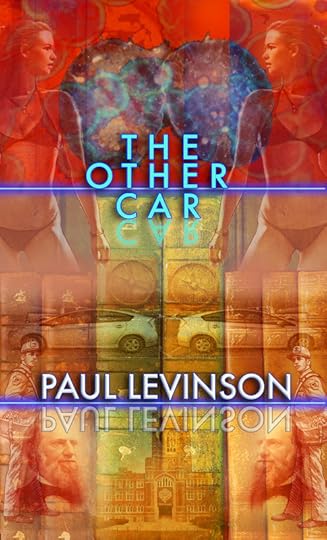 Paul Levinson's books ... Paul Levinson's music
Paul Levinson's books ... Paul Levinson's music
Published on March 31, 2015 13:10
The Walking Dead Season 5 Finale: Morgan and Optimism
The most compelling parts of The Walking Dead Season 5 finale on Sunday entailed Morgan - executing some fine ninja Jedi moves with a stick at the beginning, and showing up at the gates of Alexandria in search of Rick at the end.
His presence constitutes a kind of slow story telling rarely seen on television. He put in a memorable performance at the very beginning of the series, unable to kill his wife who had already turned. And we've seen him less than once every other season since then, including this just concluded Season 5.
Presumably Morgan will play a crucial role in the series rap-up in the next season. And that's a good move in the narrative. Morgan now represents the only tie to Rick's past when he first regained consciousness, other than Carl. Morgan should literally help tie together the conclusion with the beginning of this theater of the epic battle for the survival of humanity.
The season finale also had all other kinds of surprising optimism. All of our heroes are still alive. Michonne has picked up her sword - meaning, she's striking some of happy medium between violence and idealism, which had recently tipped too far in favor of why can't we all just live together in peace. And, crucially, Deanna has better late than never seen the wisdom of Rick's position - late, because it was too late to save her husband.
The Walking Dead has managed to put our heroes in yet another community, but one which is somehow different than all the previous monstrosities in which they've been ensconced, a community which holds real hope for an ending next season, which, while not likely by any means to be thoroughly happy, may give grounds for more optimism than we've ever seen in this series. There are still dangers everywhere - the psycho priest, the "W" gang, and of course Walkers galore - but there may be a little light glimmering at the end of tunnel for the final season.
See also: The Walking Dead 5.1: The Redemption of Carole ... The Walking Dead 5.3: Meets Alfred Hitchcock and The Twilight Zone ... The Walking Dead 5.4: Hospital of Horror ... The Walking Dead 5.5: Anatomy of a Shattered Dream ... The Walking Dead 5.6-7: Slow ... The Walking Dead 5.8: Killing the Non-Killer ... The Walking Dead 5.9: Another Death in the Family ... The Walking Dead 5.11: The Smiling Stranger ... The Walking Dead 5.12: The Other Shoe ... The Walking Dead 5.13: The Horse and the Party ... The Walking Dead 5.15: The Bad Guy
And see also The Walking Dead 4.1: The New Plague ... The Walking Dead 4.2: The Baby and the Flu ... The Walking Dead 4.3: Death in Every Corner ...The Walking Dead 4.4: Hershel, Carl, and Maggie ... The Walking Dead 4.6: The Good Governor ... The Walking Dead 4.7: The Governor's Other Foot ... The Walking Dead 4.8: Vintage Fall Finale ... The Walking Dead 4.9: A Nightmare on Walking Dead Street ... The Walking Dead 4:14: Too Far ... The Walking Dead Season 4 Finale: From the Gunfire into the Frying Pan
And see also The Walking Dead 3.3 meets Meadowlands ... The Walking Dead 3.4: Going to the Limit ... The Walking Dead 3.9: Making Crazy Sense ... The Walking Dead 3.10: Reinforcements ... The Walking Dead 3.11: The Patch ... The Walking Dead 3.12: The Lesson of Morgan ... The Walking Dead 3.13: The Deal ... The Walking Dead 3.14: Inescapable Parable ... The Walking Dead 3.15: Merle ... The Walking Dead 3.16: Kill or Die, or Die and Kill
And see also The Walking Dead Back on AMC ... The Walking Dead 2.2: The Nature of Vet ... The Walking Dead 2.3: Shane and Otis ... The Walking Dead 2.4: What Happened at the Pharmacy ... The Walking Dead 2.6: Secrets Told ... The Walking Dead 2.7: Rick's Way vs. Shane's Way ... The Walking Dead 2.8: The Farm, the Road, and the Town ... The Walking Dead 2.9: Worse than Walkers ... The Walking Dead 2.11: Young Calling the Shots ... The Walking Dead 2.12: Walkers Without Bites ... The Walking Dead Season 2 FinaleAnd see also The Walking Dead 1.1-3: Gone with the Wind, Zombie Style ... The Walking Dead Ends First Season
#SFWApro

a different plague here
Paul Levinson's books ... Paul Levinson's music
His presence constitutes a kind of slow story telling rarely seen on television. He put in a memorable performance at the very beginning of the series, unable to kill his wife who had already turned. And we've seen him less than once every other season since then, including this just concluded Season 5.
Presumably Morgan will play a crucial role in the series rap-up in the next season. And that's a good move in the narrative. Morgan now represents the only tie to Rick's past when he first regained consciousness, other than Carl. Morgan should literally help tie together the conclusion with the beginning of this theater of the epic battle for the survival of humanity.
The season finale also had all other kinds of surprising optimism. All of our heroes are still alive. Michonne has picked up her sword - meaning, she's striking some of happy medium between violence and idealism, which had recently tipped too far in favor of why can't we all just live together in peace. And, crucially, Deanna has better late than never seen the wisdom of Rick's position - late, because it was too late to save her husband.
The Walking Dead has managed to put our heroes in yet another community, but one which is somehow different than all the previous monstrosities in which they've been ensconced, a community which holds real hope for an ending next season, which, while not likely by any means to be thoroughly happy, may give grounds for more optimism than we've ever seen in this series. There are still dangers everywhere - the psycho priest, the "W" gang, and of course Walkers galore - but there may be a little light glimmering at the end of tunnel for the final season.
See also: The Walking Dead 5.1: The Redemption of Carole ... The Walking Dead 5.3: Meets Alfred Hitchcock and The Twilight Zone ... The Walking Dead 5.4: Hospital of Horror ... The Walking Dead 5.5: Anatomy of a Shattered Dream ... The Walking Dead 5.6-7: Slow ... The Walking Dead 5.8: Killing the Non-Killer ... The Walking Dead 5.9: Another Death in the Family ... The Walking Dead 5.11: The Smiling Stranger ... The Walking Dead 5.12: The Other Shoe ... The Walking Dead 5.13: The Horse and the Party ... The Walking Dead 5.15: The Bad Guy
And see also The Walking Dead 4.1: The New Plague ... The Walking Dead 4.2: The Baby and the Flu ... The Walking Dead 4.3: Death in Every Corner ...The Walking Dead 4.4: Hershel, Carl, and Maggie ... The Walking Dead 4.6: The Good Governor ... The Walking Dead 4.7: The Governor's Other Foot ... The Walking Dead 4.8: Vintage Fall Finale ... The Walking Dead 4.9: A Nightmare on Walking Dead Street ... The Walking Dead 4:14: Too Far ... The Walking Dead Season 4 Finale: From the Gunfire into the Frying Pan
And see also The Walking Dead 3.3 meets Meadowlands ... The Walking Dead 3.4: Going to the Limit ... The Walking Dead 3.9: Making Crazy Sense ... The Walking Dead 3.10: Reinforcements ... The Walking Dead 3.11: The Patch ... The Walking Dead 3.12: The Lesson of Morgan ... The Walking Dead 3.13: The Deal ... The Walking Dead 3.14: Inescapable Parable ... The Walking Dead 3.15: Merle ... The Walking Dead 3.16: Kill or Die, or Die and Kill
And see also The Walking Dead Back on AMC ... The Walking Dead 2.2: The Nature of Vet ... The Walking Dead 2.3: Shane and Otis ... The Walking Dead 2.4: What Happened at the Pharmacy ... The Walking Dead 2.6: Secrets Told ... The Walking Dead 2.7: Rick's Way vs. Shane's Way ... The Walking Dead 2.8: The Farm, the Road, and the Town ... The Walking Dead 2.9: Worse than Walkers ... The Walking Dead 2.11: Young Calling the Shots ... The Walking Dead 2.12: Walkers Without Bites ... The Walking Dead Season 2 FinaleAnd see also The Walking Dead 1.1-3: Gone with the Wind, Zombie Style ... The Walking Dead Ends First Season
#SFWApro

a different plague here
Paul Levinson's books ... Paul Levinson's music
Published on March 31, 2015 11:57
March 29, 2015
Black Sails Season 2 Finale: Satisfyingly Literate and Vulgar
 Well, the Black Sails season 2 finale last night was satisfying and everything it should have been and needed to be to offset the punch-in-the-gut depravity at the end of last week's episode.
Well, the Black Sails season 2 finale last night was satisfying and everything it should have been and needed to be to offset the punch-in-the-gut depravity at the end of last week's episode.That ending - the slaughter of Miranda by the Governor's body guard, by a shot to her head as she was passionately remonstrating the Governor - was the worst and most infuriating death we've seen on Black Sails. True, the shooter had warned Miranda previously not to get so close and voluble to the Governor, but his act was nonetheless an outrageous, horrendous bolt from the blue.
Certainly Flint thought so, and that one act erased once and forever all the good thoughts he had been having about working together with the authorities. This in turn set up the season 2 finale, in which the two main pirates in our story, Flint and Vane, fight together to destroy whatever they can of the Governor's city. It was truly a pleasure to behold, from the freeing of Flint by Vane to Flint's ordering a barrage of cannon fire on the city after the two are safely aboard their ship in the harbor.
Lots of good developments on the ship back in the Nassau vicinity, too, with Silver finally getting promoted to quartermaster at the end, and getting set to get his peg leg, for which the character is so renown in the fictional Robert Louis Stevenson history. Not that it was good to see Silver lose his leg, but his moving into quartermaster and soon to have a peg leg clicks another piece into place of this pseudo-history that we know so well.
And Max's ascendancy to the Queen of Thieves on the island - great moniker given for Eleanor last week - was also good to see. Eleanor being brought back to England for trial and who knows what else promises some more colorful scenes in London in season 3. (The London scenes in season 2 were always welcome.) Not to mention the glimpse we got of Black Beard - another real pirate, like Vane - in the preview of season 3.
Black Sails at the end of two seasons has done well for itself. Unpredictable, exciting, literate and vulgar mix of fiction and history - what more could you ask for in a pirate story?
See also Black Sails 2.1: Good Combo, Back Story, New Blood ... Black Sails 2.2: A Fine Lesson in Captaining ... Black Sails 2.3: "I Angered Charles Vane" ... Black Sails 2.4: "Fire!" ... Black Sails 2.5: Twist! ... Black Sails 2.6: Weighty Alternatives, and the Medium is the Message on the High Seas ...Black Sails 2.7: The Governor's Daughter and the Gold ... Black Sails 2.9: The Unlikely Hero
And see also Black Sails: Literate and Raunchy Piracy ... Black Sails 1.3: John Milton and Marcus Aurelius ... Black Sails 1.4: The Masts of Wall Street ...Black Sails 1.6: Rising Up ... Black Sails 1.7: Fictions and History ... Black Sails 1.8: Money
#SFWApro

pirates of the mind in The Plot to Save Socrates
Paul Levinson's books ... Paul Levinson's music
Published on March 29, 2015 10:10
March 28, 2015
Bloodline: Mainlining Family
 Just finished Bloodline, the latest all-at-once television series on Netflix. My wife and I slow binge-watched it, for a variety of reasons, mostly because the complex drama was better savored with a just an episode or two each evening. Netflix has once again hit the mark with an outstanding series, right up up there in its own way with House of Cards and Peaky Blinders, and Amazon's Bosch.
Just finished Bloodline, the latest all-at-once television series on Netflix. My wife and I slow binge-watched it, for a variety of reasons, mostly because the complex drama was better savored with a just an episode or two each evening. Netflix has once again hit the mark with an outstanding series, right up up there in its own way with House of Cards and Peaky Blinders, and Amazon's Bosch.First, the locale is evocative, and best seen in high definition. We spend lots of time on Cape Cod, which makes me a sucker for anything with a similar land and seascape. The Florida Keys in Bloodline work just fine as a surrogate Cape.
The story is about a dysfunctional family - to say the least - and the deaths and dynamics of its members make Bloodline a distant cousin, I suppose, of Ray Donovan. But the narrative is unique and original and all its own.
Ben Mendelsohn puts in a standout performance as Danny, a black sheep prodigal son who returns for a family gathering. We soon see he's been scapegoated - whether fairly or unfairly - and the family is split about being happy to see him again, with his mother, played Sissy Spacek, most in favor. What I can tell you, without giving two much away, is that Danny is a masterful deconstructionist, able in any conversation with a family member to pull out just the right stone from their foundation which will cause them to crumble, or close to it. He also has a good head for crime.
His prime check is his slightly younger brother John, a local lawman, played by Kyle Chandler, in easily his best role since the immortal Coach in Friday Night Lights. Strong performances are indeed on hand from everyone, and its was especially good to see Linda Cardellini (Mad Men!) as sister Meg, Sam Shepard as the father, and Big Love's Chloë Sevigny as Danny's sorta girlfriend.
The series is a creation of Glenn and Todd Kessler - best known for their superb Damages - and Bloodline bears the same stamp - dark, deadly, human souls stripped almost bear, and glimpses of the ending to tease the audience, which might have worked better in Damages then in Bloodline, which still should be at the top of your binge-watching television list.
#SFWApro
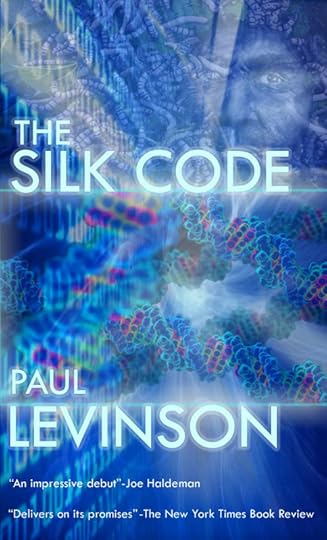
not about a dysfunctional family, but a dysfunctional species Paul Levinson's books ... Paul Levinson's music
Published on March 28, 2015 16:46
12 Monkeys 1.11: What Ifs
 Science fiction is intrinsically about what if this or that incredible event happened, and time travel is especially, and this is what 12 Monkeys 1.11, which does time travel so well, offered us last night, at least twice.
Science fiction is intrinsically about what if this or that incredible event happened, and time travel is especially, and this is what 12 Monkeys 1.11, which does time travel so well, offered us last night, at least twice.What if Jones were left alone at the time travel facility, with Cole never returning, her dwindling military support leaving, and even the guy who operates the time machine packing his bags and moving out? Jones, as aware of herself as Socrates, knows she won't leave. Where else would she go? What else would she do? All of this will likely be soon changed as Cole gets back in the picture, but Jones alone in the time travel facility was a touching set piece that could have come out of a Ray Bradbury story.
The other what-if flows from the same event that prevented Cole - at least temporarily - from returning to 2043. He's fighting to the death with Ramse in 1980s Tokyo. The result leaves Cole badly wounded, and Ramse arrested and thrown in a Japanese prison. There he lives for years, contacted by some benefactor who takes an interest him, and eventually brings him to her facility when Ramse is released.
We're thus treated to an alternate reality in which Ramse has been living in the past into our current age all along - but is this really alternate? It could be, if Ramse's experiences in this past amount to a dead end. But there's a strong implication that maybe Ramse had indeed been in the past all along, interacting with and triggering the Goines, and intersecting with the Witness. In other words, in all of the 12 Monkeys episodes we've seen up until this episode, with Cole often traveling back to the past, and Ramse ensconced in the future, an older version of this same Ramse, with the same memories and all, was already in the past, and maybe event to some extent not only reacting to but calling the shots.
Time travel has, until this series, been at its best in short stories, novel, and movies. Television has checked in with a great episode from time to time - such as "City on the Edge of Forever" in Star Trek: TOS and "Yesterday's Enterprise" in Star Trek: TNG - but the series have been pale in comparison to what has been donewith time travel in other kinds of narratives. 12 Monkeys on Syfy, for the first time, is rolling out a tableau and story with complex and paradoxical parts truly worthy of the time travel genre.
See also this Italian review, w/reference to Hawking and my story, "The Chronology Protection Case"
And see also 12 Monkeys series on SyFy: Paradox Prominent and Excellent ...12 Monkeys 1.2: Your Future, His Past ... 12 Monkeys 1.3: Paradoxes, Lies, and Near Intersections ... 12 Monkeys 1.4: "Uneasy Math" ... 12 Monkeys 1.5: The Heart of the Matter ... 12 Monkeys 1.6: Can I Get a Witness? ... 12 Monkeys 1.7: Snowden, the Virus, and the Irresistible ... 12 Monkeys 1.8: Intelligent Vaccine vs. Time Travel ... 12 Monkeys 1.9: Shelley, Keats, and Time Travel ... 12 Monkey 1.10: The Last Jump
podcast review of Predestination and 12 Monkeys



three time travel novels: the Sierra Waters trilogy



What if the Soviet Union survived into the 21st century,
and Eddie and the Cruisers were a real band?

The Chronology Protection Case movie
~~~ +++ ~~~
#SFWApro
Paul Levinson's books ... Paul Levinson's music
Published on March 28, 2015 14:38
Levinson at Large
At present, I'll be automatically porting over blog posts from my main blog, Paul Levinson's Infinite Regress. These consist of literate (I hope) reviews of mostly television, with some reviews of mov
At present, I'll be automatically porting over blog posts from my main blog, Paul Levinson's Infinite Regress. These consist of literate (I hope) reviews of mostly television, with some reviews of movies, books, music, and discussions of politics and world events mixed in. You'll also find links to my Light On Light Through podcast.
...more
- Paul Levinson's profile
- 342 followers



